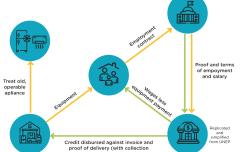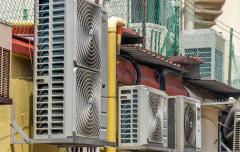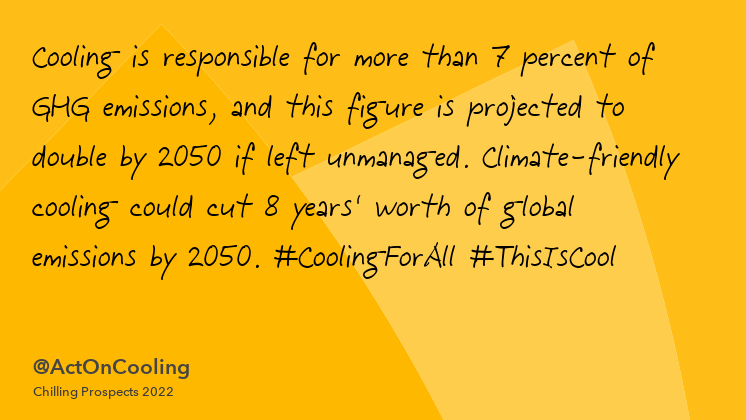Chilling Prospects 2022: The role of National Cooling Action Plans in delivering the global environment agenda
 |
Reflections on five years of the Kigali Amendment by the Cool Coalition |
Increasing temperatures, growing economies, and more frequent heat waves and extreme weather events across the globe are resulting in a growing demand for cooling services.
In recent years, the issue of promoting sustainable and affordable access to cooling has emerged as an area of focus for governments, the health and food industry, real estate and technology providers, and financial institutions. Cooling services are essential to provide human comfort and productivity and ensure the safety of foods, medicine and vaccines, but can have negative environmental and economic impacts. Cooling is currently responsible for more than 7 percent of GHG emissions, and this figure is projected to double by 2050 if left unmanaged. Given the adverse impact of cooling on greenhouse gas (GHG) emissions and climate change, accelerated global efforts on policy, technology and finance availability for sustainable cooling have now become inevitable. Climate-friendly cooling could cut 8 years’ worth of global emissions by 2050.
Current global status
Since the inception of the Kigali Amendment, the need for holistic and synergistic actions on achieving the Sustainable Development Goals (SDGs), Nationally Determined Contributions (NDCs) and Kigali Amendment targets has been witnessed globally. National Cooling Action Plans (NCAPs), a global policy best practice, have gained prominence among countries beginning to develop long-term policy strategies. Starting in 2018 several countries opted to develop an NCAP with technical support from specialized agencies and address the cross-cutting nature of cooling, to bring stakeholders from government, industry and academia to the table, discuss needs and possible solutions, and translate this into a document that would provide a roadmap for action.
To accelerate global efforts, in 2020 the Cool Coalition brought together several of these NCAP pioneers and members and developed a guiding framework and holistic but modular methodology for the development of NCAPs that cover cooling comprehensively, including various sectors and end uses, and both met and unmet cooling needs. Currently, over 30 NCAPs are at various stages of development. Several countries, including Cambodia, Indonesia and Pakistan, are piloting the Cool Coalition methodology to develop their plans, and others have leveraged the methodology to strengthen their ongoing work.
Cool Coalition together with its partners organized a series of workshops between June and September 2021 to launch the NCAP Methodology, capture experiences and lessons learned from leading countries, and build capacity among national policymakers and stakeholders on developing and implementing NCAPs in various regions of the world. Some examples are:
India: The India Cooling Action Plan (ICAP) was among the first NCAPs launched in March 2019, developed by the Ministry of Environment, Forest and Climate Change (MoEFCC). The ICAP presents a 20-year outlook on how cooling demand in India will evolve in priority-demand sectors, and outlines strategies and actions that promote sustainable and smart cooling practices across the nation while mitigating adverse impacts. This landmark policy document demonstrates unprecedented inter-ministerial and cross-sectoral collaboration in identifying ambitious goals and laying out actionable pathways.
The government has established an implementation framework through inter-ministerial and cross-sectoral working groups by aligning the plan with sectoral priorities and existing policy frameworks. Multilateral development organizations and financial institutions are increasingly viewing cooling through the ICAP as an investment opportunity, and the World Bank Group has conducted a study to operationalize the implementation of the ICAP through multilateral investments.
Panama: Unlike most NCAPs, Panama’s NCAP falls under the Ministry of Health. The Panama Cooling Plan (PCP) was developed by three key government entities on cooling: the Ministry of Health, the Ministry of Environment and the National Secretariat of Energy and was supported by the UNDP. The PCP emphasizes the sustainability of the transition process and the importance of the participation of the private sector and the general public, and places special emphasis on women and the needs of the most vulnerable. The plan is helping the government to align policies and programmes, identify synergies related to climate change, environment and health, and transition to climate-friendly refrigerants.
Rwanda: Rwanda was a pioneer in the development of its NCAP four years ago and now has ambitious cooling targets to reduce GHG emissions to 38 percent, rigorous energy-efficiency regulations and, together with the UK government, is developing the Africa Centre of Excellence for Sustainable Cooling and Cold-Chain (ACES). Its main objective is to address the complex and cross-cutting nature of climate-friendly cooling and incorporate the agriculture, health, industry, and building and construction sectors, both public and private. The NCAP serves as a call to sustained action with strategies that can be built upon over time. It is continuously strengthened and has a built-in ecosystem of multi-sector collaboration. Rwanda has a long-term vision to expand and collaborate regionally and internationally and is developing funding schemes to create access to sustainable cooling solutions and products.
Cambodia: The Government of Cambodia through the Ministry of Environment’s National Ozone Unit and its Department on Climate Change, and in collaboration with six other ministries, has prepared a comprehensive NCAP in partnership with the UN Environment Programme (UNEP) Cool Coalition and the Economic and Social Commission for Asia and the Pacific (ESCAP). It has included comprehensive cooling measures in its updated NDC and is now working towards the integration of passive cooling into its green building guidelines.
The aim of the NCAP is to build upon the existing work on the hydrochlorofluorocarbon (HCFC) phaseout and forthcoming Kigali Amendment implementation plans to integrate energy-efficiency and demand-reduction measures and in doing so accelerate refrigerant transition and maximize GHG emission reduction benefits. The development of the NCAP has helped the Government of Cambodia unify information on multiple cooling sectors, analyze potential economic, energy and GHG savings and identify pathways to integrate comprehensive action to address its current and future cooling demands.
Way forward and call for action
NCAPs have been recognized by countries, partners, the Technical and Economic Assessment Panel (TEAP) and the UN alike as key to linking efficiency and the refrigerant transition and maximizing climate benefits.
NCAPs are an important first step to establish frameworks and catalyze integrated and comprehensive action on cooling and cold chains. They can be used as a long-term strategy to achieve NDC targets and develop and deploy Kigali Amendment implementation plans. NCAPs have also helped countries attract finance for implementation.
However, the development of NCAPs requires resources. To date, these resources have been largely provided by the Clean Cooling Collaborative (formerly the Kigali Cooling Efficiency Program (K-CEP)). Green Climate Funds (GCF) has indicated that countries can request its readiness funds to develop NCAPs, and several other development banks have also signalled their interest in supporting countries.
The Cool Coalition finance working group will also explore opportunities to support member countries who express an interest in developing NCAPs. However, given the importance of NCAPs in accelerating the refrigerant transition, it is hoped that funds could also be made available under the Multilateral Fund for the Implementation of the Montreal Protocol (MLF).
Meet our Global Panel on Access to Cooling member from the Cool Coalition
Related content

Data analysis
07 Jun 2022

Data analysis
05 May 2021

Data analysis
13 May 2022

Data analysis
07 Jun 2022


